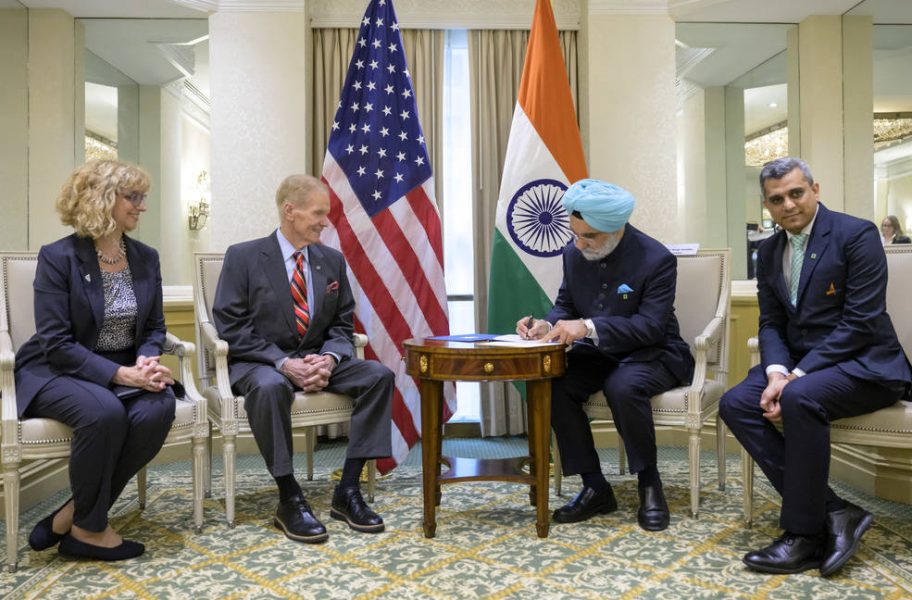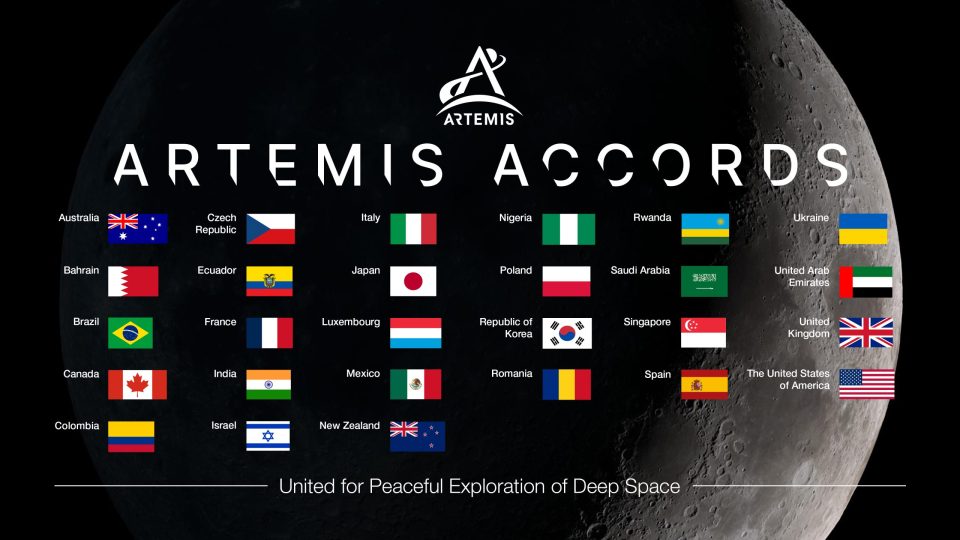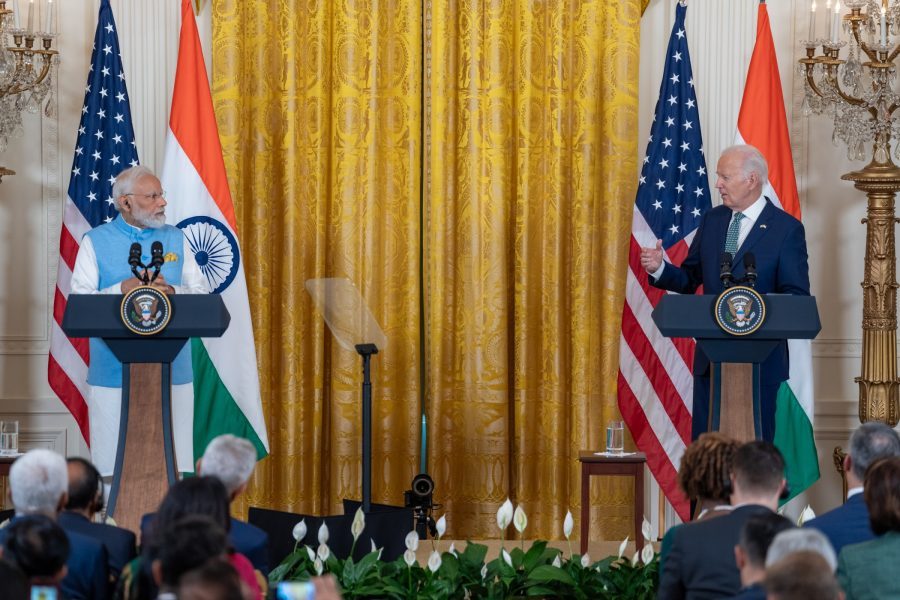
Explained | Artemis Accords: What they mean for India, ISRO's astronauts

During Prime Minister Narendra Modi’s historic State visit to the US last week, India signed the Artemis Accords, which are committed to peaceful, sustainable, and transparent cooperation that will enable exploration of the Moon, Mars, and beyond.
At a ceremony in Washington, D.C. on June 21, India became the 27th nation to sign the Artemis Accords. Indian Ambassador to the US Taranjit Sandhu signed on behalf of the Government of India.
What are Artemis Accords?
The Artemis Accords, which are grounded in the Outer Space Treaty (OST) of 1967, are a set of non-legally binding principles to guide sustainable civil space exploration. These principles, which include transparency, peaceful purposes, registering of space objects and release of scientific data, help make the space environment safer and more predictable, and allow all nations – even those without space programmes – to benefit from the scientific data obtained in space, according to the US.
Also read: Modi in US: India to send astronaut to International Space Station in 2024, joins Artemis Accords
“From the original eight nations in 2020, Artemis Accords signatories now hail from every part of the globe and possess a variety of space capabilities and interests. By working together, we can advance the beneficial use of outer space for all humankind,” the US Department of State said in a statement.
Co-led for the US by the Department of State and the National Aeronautics and Space Administration (NASA), the Artemis Accords were launched on October 13, 2020 with Australia, Canada, Italy, Japan, Luxembourg, the United Arab Emirates, the United Kingdom, and the United States.
Who are the 27 signatories of Artemis Accords?
The Artemis Accords signatories are: Australia, Bahrain, Brazil, Canada, Colombia, Czech Republic, Ecuador, France, India, Israel, Italy, Japan, the Republic of Korea, Luxembourg, Mexico, New Zealand, Nigeria, Poland, Romania, Rwanda, Saudi Arabia, Singapore, Spain, Ukraine, the United Arab Emirates, the United Kingdom, and the United States.
Also read: Modi’s US visit was a success, but then America needs India now

What are the principles of the Artemis Accords?
- Peaceful Exploration: All activities conducted under the Artemis program must be for peaceful purposes
- Transparency: Artemis Accords signatories will conduct their activities in a transparent fashion to avoid confusion and conflicts
- Interoperability: Nations participating in the Artemis program will strive to support interoperable systems to enhance safety and sustainability
- Emergency Assistance: Artemis Accords signatories commit to rendering assistance to personnel in distress
- Registration of Space Objects: Any nation participating in Artemis must be a signatory to the Registration Convention or become a signatory with alacrity
- Release of Scientific Data: Artemis Accords signatories commit to the public release of scientific information, allowing the whole world to join us on the Artemis journey
- Preserving Heritage: Artemis Accords signatories commit to preserving outer space heritage
- Space Resources: Extracting and utilizing space resources is key to safe and sustainable exploration and the Artemis Accords signatories affirm that such activities should be conducted in compliance with the Outer Space Treaty
- Deconfliction of Activities: The Artemis Accords nations commit to preventing harmful interference and supporting the principle of due regard, as required by the Outer Space Treaty
- Orbital Debris: Artemis Accords countries commit to planning for the safe disposal of debris
Also read: PM Modi in US: 5 major takeaways in key areas including defence, space
How Artemis Accords will benefit India
With India signing the Artemis Accords, NASA will provide advanced training to Indian Space Research Organisation (ISRO) astronauts with the goal of launching a joint effort to the International Space Station (ISS) in 2024, a statement from the White House said.
“Additionally, NASA and the ISRO are developing a strategic framework for human spaceflight cooperation by the end of 2023. India approved a $318 million investment to construct a Laser Interferometer Gravitational-Wave Observatory in India — that will work in tandem with similar facilities in the United States, Europe, and Japan to look for ripples in space-time, known as gravitational waves, that provide insights into the physical origins of the universe.
“Scientific payloads for the NASA-ISRO Synthetic Aperture Radar (NISAR) have been delivered to India and will be launched in 2024, and will measure Earth’s changing ecosystems like natural hazards and sea level rise. The US Geological Survey and ISRO are negotiating expanded bilateral data exchange that will enable greater insight about the earth, including for a range of applications, such as climate resiliency, sustainable development and management of natural resources, and disaster management support,” it added.
Also read: Modi wraps up US tour, says new and proud journey of ties has begun
What PM Modi, President Biden said on Artemis Accords
PM Modi said by joining the Artemis Accords, India has taken “a big leap”.
“By taking the decision to join the Artemis Accords, we have taken a big leap forward in our space cooperation. In fact, in short, for India and America partnership, even the sky is not the limit,” PM Modi said.

US President Joe Biden “deeply appreciated” India’s signing of the Artemis Accords, according to the White House.
Also read: PM Modi on India-US partnership: ‘Even the sky is not the limit’
India-US joint statement
In a joint statement, Modi and Biden set a course to reach new frontiers across all sectors of space cooperation.
“The leaders applauded our growing cooperation on earth and space science, and space technologies. They welcomed the decision of NASA and ISRO to develop a strategic framework for human spaceflight cooperation by the end of 2023,” the joint statement said.
Modi and Biden also hailed the announcement by NASA to provide advanced training to Indian astronauts at the Johnson Space Center in Houston, Texas, with a goal of mounting a joint effort to the International Space Station in 2024.
Also read: US to open consulates in Bengaluru, Ahmedabad
The leaders also celebrated the delivery of the NASA-ISRO Synthetic Aperture Radar (NISAR) satellite to ISRO’s U.R. Rao Satellite Centre in Bengaluru, India, and looked forward to NISAR’s 2024 launch from India.
“Welcoming India’s Space Policy – 2023, the leaders called for enhanced commercial collaboration between the U.S. and Indian private sectors in the entire value chain of the space economy and to address export controls and facilitate technology transfer,” as per the joint statement.


